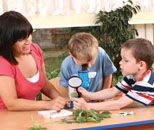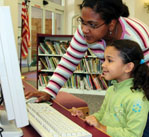 |
|
 |

| Afterschool Tutoring
For afterschool and expanded-learning programs that strive to boost student academic achievement during the regular school day, tutoring programs can play an important role in reaching this goal. The components of a successful tutoring program are the same regardless of the content area:
The Afterschool Training Toolkit, developed by the National Partnership for Quality Afterschool Learning, contains several free resources for afterschool tutoring. For an overview of tutoring in afterschool, visit the homework section of the toolkit. The different toolkit content areas also have suggestions for how to provide tutoring in specific subject areas like literacy, math, and science. Literacy. Encourage tutors to incorporate a wide range of literacy activities into the tutoring sessions. For example, discuss with students what they are currently reading, use drawing and writing activities, act out stories, or play literacy games. Recruit a school reading specialist, teacher, or retired teacher to provide tutors with the support they need to reflect on their work with students. Learn more. Math. Once afterschool instructors and students have identified specific math skills to work on, determine short- and long-term goals. For example, if a younger student is struggling to add two-digit numbers, a short-term goal would be to master equations using base-10 blocks or other manipulatives. A long-term goal would be for the student to be able to add without using manipulatives. Learn more. Science. Students may find it easier to break down challenging informational text found in science books if they are able to read about and discuss real-world problems related to science. In addition, try creating activities that let students measure and represent data using tables and graphs to help students develop the math skills that are critical to success in science. Learn more. |
The SEDL National Center for Quality Afterschool helps state education agencies and local practitioners develop high-quality programs for academic enrichment as well as youth development activities. |

| 
Afterschool Training Toolkit Print Materials Used with the online Afterschool Training Toolkit, these books give you the resources you need to build fun, innovative, and academically enriching activities that engage students, extend their knowledge in new ways, and support academic achievement.
|

|
Tutoring With Technology
|
 |
 |
 |
||||||
Get It in Writing |
|
|||||||
This e-mail was sent by: Editor: Laura Shankland
|
You are welcome to reproduce issues of AfterWords and distribute copies at no cost to recipients. Please credit SEDL as publisher. Link to PDF versions of AfterWords is available here. For additional uses, please fill out and submit a copyright request form. Copyright © 2009 by SEDL. |


